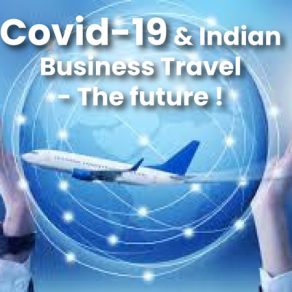This analysis, from a business travel consultant’s standpoint, outlines how Covid19 will impact Indian business travel.
Covid19 will have a far greater impact on the global economy & travel than 9/11.In the immediate short-term, the impact on business travel is severe. Apart from lockdowns and suspended flights, a new aspect – that of employee willingness to travel will be an added dimension. Post COVID19, employers will need to insulate employees from health risks – either with structured medical protocols, vaccinations, on-road protection, insurance & other mechanisms.
These aspects – corporate duty of care & aversion of employees to health risks associated with travel, are situations that most Indian travel programs have never recognized. This will demand creativity and new models of operations.
In the medium term, business travel will get back its importance. This will be driven by economic reasons. It’s expected that most countries will actively plan broad basing their manufacturing rather than keeping everything in China.
This will be a massive opportunity for emerging markets like India, Vietnam, Indonesia and Thailand. Further , every time there is a global recession, the Indian economy & consequently business travel has grown substantially – Post 9/11 and then again after the 2008 recession.
The economic arbitrage that India offers for in knowledge based industries like IT / Tech Outsourcing / BPO should be in high demand.
Business travel managers, in corporate enterprise will be well served, to use the current downtime to critically evaluate their programs. Despite , India’s growth to being the 7th largest global business travel market, most business travel programs in India subscribe to legacy out-dated processes.
Inertia & the desire to maintain status quo, are two major bottleneck that are very visible in the Indian business travel buyer community. This is supplemented by industry being unable to articulate the value of technology & innovation – they are still caught up in offering the lowest fees possible & generally perpetuating legacy opaque systems.
As a business travel consultant, ProKonsul has often highlighted the historical absence of CXO attention on business travel optimization in Indian corporations. Post Covid19, it is expected that Indian CXO’s will focus their attention on their 2nd largest controllable expense – Business Travel!
With the incremental pressures on the P&L , they should demand effective cost control with optimization, innovation & accountability from their travel teams.
Those travel managers & administrators who are unable to deliver increment program efficiency & value, will have a short shelf life !
These are some of the most important opportunities that Indian business travel programs have
1.Strategic sourcing
To be successful, buyers will need to deliver meaningful value to suppliers who offer the best value. This will mean limiting the number of partners, developing a share shift model so preferred partners get more business & driving year on year savings. This will also mean that the current buyer approach of exclusively sourcing the lowest cost vendor will need to be questioned.
It’s been proven time and again that there is a minimum economic cost, for a service to be delivered. If a vendor claims to magically operate below that threshold or at a significant loss, the only way that can be done, is that the vendor operates unethically.
This approach to strategic sourcing will need to extend to every aspect of the business travel program – Airline sourcing / Hotels / Business Travel events & MICE and other component of the business travel lifecycle.
This will be of even greater value to Indian multinationals who have an expanding global footprint but operate without a global business travel program.
2.Automate/ adopt technology / Optimize travel administration resources
Much of business travel in emerging markets like India , is heavy on human resources. It’s common to see several internal staff managing, tracking, checking, paying vendors. These are superfluous, in todays world.
Unfortunately this is equally true of iconic Indian global companies, who are part of the Fortune 500 list. They have given little thought to adopting accepted best practice. Most still have a dis-aggregated program structure with retail buying driving significant corporate exposure
Technology will need to be adopted in every part of business travel
- Self-booking technology
- Event management automation
- RFP and Sourcing platforms
- Expense management
- Payment systems
- Reporting and analytics
Travel managers will be challenged to evaluate these solutions and present a business case to their corporate leadership. They will equally need to demand innovation and ideas from their business partners – travelmanagement companies, event managers , airlines & hotels.
It is time to stop the exclusive & self limiting focus on using the cheapest fare or appointing the lowest cost vendor , as the primary measure of success ! Program value , optimzation and automation can deliver far greater value than just the lowest fee or fare.
3.Business Travel Audits
Just as all companies conduct financial and tax audits, ProKonsul believes that business travel audits must become the standard, in all corporate programs.
As any corporate program ages, and different components are added at different stages, inefficiencies build up. This gets overlooked as the complexity rises and day-to-day firefighting becomes the standard.
ProKonsul is the only business travel consulting firm that offers a proprietary Program & Process Analytics® & complete suite of business travel audit solutions to validate invoicing, refunds, credits and commission reporting of the incumbent travel management company / vendor.
To secure long term value through independent business travel intelligence, companies will engage external business travel consultants like ProKonsul, who have depth of knowledge & the ability to optimise every element of the business travel lifecycle.
4.Secure immediate savings inherent in your business travel program
Global VAT Reclaim is the single biggest savings opportunity in Business Travel. This concept allows for recovery of the VAT / GST portion of expenses incurred overseas, in designated countries. The potential for savings exceeds 25% of specific expenses incurred . Similarly there are inherent opportunities in Business Travel MICE and Domestic VAT Reclaim.
Post Covid19, Indian business travel managers will need to actively learn and implement best practice. They will need to present innovation and cost efficiency to their corporate leadership, as a way of maintaining relevancy & counting as an important part of the corporate decision making team.
Want to set up your 30-minute FREE consultation with a ProKonsul business travel expert?
Drop us an email prokonsul@prokonsul.in or call +91-9873196115.
We would love to work with you! Call us now !!
ProKonsul ® optimizes the business travel lifecycle of its clients. It delivers domain expertise in enterprise business travel. Established in 2014, it is the pre-eminent business travel consultant firm in India, Asia & emerging markets. We are located in Gurgaon, India. ProKonsul ® advisory services are supplier agnostic & governed by a robust integrity policy.
2020 © ProKonsul – All Rights Reserved



